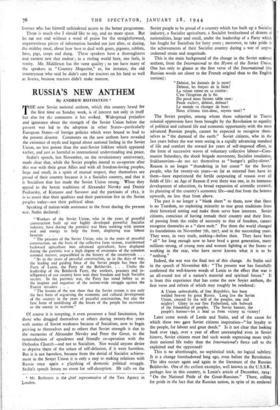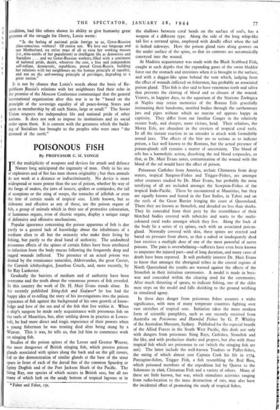RUSSIA'S NEW ANTHEM
By ANDREW ROTHSTEIN *
THE new Soviet national anthem, which this country heard for the first time on Sunday week, is of interest not only in itself but also for the comments it has evoked. Widespread prejudice and ignorance about the strength of the Soviet Union before the present war led to the adoption in other States—particularly European States—of foreign policies which were bound to lead to the present disaster. Comments on the new anthem have revealed the existence of myth and legend about national feeling in the Soviet Union, no less potent than the anti-Soviet folklore which appeared earlier, and just as harmful to international understanding and peace.
Stalin's speech, last November, on the revolutionary anniversary, made clear that, while the Soviet peoples intend to co-operate after this war with their great Allies and with all freedom-loving peoples, large and small, in a spirit of mutual respect, they themselves are proud of their country because it is a Socialist country, and that it is Socialism that has made the Soviet Union strong. When they appeal to the heroic traditions of Alexander Nevsky and Dmitir Pozharsky, of Kutuzov and Suvorov and the partisans of 1812, it is to assert that their qualities and their patriotism live in the Soviet peoples today—not their political ideas.
Speaking of nation-wide assistance to the front during the present war, Stalin declared: •
" Workers of the Soviet Union, who in the years of peaceful construction built up our highly developed powerful Socialist industry, have during the patriotic war been working with intense zeal and energy to help the front, displaying true labour
heroism . .
" The peasants of the Soviet Union, who in the years of peaceful construction, on the basis of the collective farm system, transformed backward agriculture into advanced agriculture, have displayed during the patriotic war a high degree of awareness of the common national interest, unparalleled in the history of the countryside . . . " As in the years of peaceful construction, so in the days of war, the leading and guiding force of the Soviet people has been the Party of Lenin, the Party of the Bolsheviks. . . . Under the leadership of the Bolshevik Party, the workers, peasants and in- telligentsia of our country have won their freedom and built Socialist society. In the patriotic war, the Party has stood before us as the inspirer and organiser of the nation-wide struggle against the Fascist invaders . . .
" The lessons of the war show that the Soviet system is not only the best form of organising the economic and cultural development of the country in the years of peaceful construction, but also the best form of mobilising all the forces of the people for resistance to the enemy in wartime."
Of course it is tempting, it even possesses a fatal fascination, for those who drugged themselves or others during twenty-five years with stories of Soviet weakness because of Socialism, now to begin proving to themselves and to others that Soviet strength is due to the memories of Alexander Nevsky and Peter the Great, to the reintroduction of epaulettes and friendly co-operation with the Orthodox Church—and not to Socialism. Nor would anyone desire to deprive them of the solace of self-delusion, if it were harmless. But it is not harmless, because from the denial of Socialist achieve- ment in the Soviet Union it is only a step to making relations with Russia once again a plaything of domestic political struggle. Stalin's speech leaves no room for self-deception. He calls on the
Mr. Rothstein is the chief representative of the Tass Agency in London.
Soviet people to be proud of a country which has built up a Soc. ialist industry, a Socialist agriculture, a Sociali4t brotherhood of ddzeris of nationalities, large and small, under the leadership of a Party which has fought for Socialism for forty years ; moreover, to take pride in the achievements of their Socialist country during a war of unpre- cedented strain and magnitude.
This is the main background of the change in the Soviet national anthem, from the International to the Hymn of the Soviet Union. One has only to glance at the first verse of the International (the Russian words are closer to the French original than to the English version): "DebOut, les damns de k terre!
Debout, les forcats de la faim!
La raison tonne en sa cratere: C'est l'eruption de la fm.
Du passé nous faisons table rase: Foule esclave, debout, debout!
Le monde va changer de base: Nous n'etions rien-donc, soyons tout!
The Soviet peoples, among whom those subjected to Tsarist colonial oppression have been brought by the Revolution to equality of political and cultural life and economic opportunity-with the most advanced Russian people, cannot be expected to recognise them- selves as " the damned of the earth." Soviet citizens, who in the last years before the war were seeing in a rapidly advancing standard of life and comfort the reward for years of self-imposed effort, in the form of successive waves of voluntary collective labour—Com- munist Saturdays, the shock brigade movement, Socialist emulation, Stakhanovism—do not see themselves as " hunger's galley-slaves."
Reason is no longer " thundering in her crater " for the Soviet people, who for twenty-six years—so far as external foes have let them—have experienced the fertile outpouring of reason over all fields of life: an Age of Reason if ever there was one, in its immense development of education, its broad expansion of scientific research, its planning of the country's economic life—and that from the bottom upwards, no less than from above.
The past is no longer a " blank sheet " to them, now that there is no Tsardom, no exploiting minority to tear great traditions from their historical setting and make them serve base interests. Soviet citizens, conscious of having remade their country and their lives, of passing from the realm of necessity to that of freedom, cannot recognise themseles as a " slave mob." For them the world changed its foundations on November 7th, 1917, and in the succeeding years. They were, in very truth, nothing—before then. They..havebeen " all " for long enough now to have bred a great generation, many
millions strong, of young men and women fighting at-the fronts or working in the rear, who have never known what it is to be
" nothing." • Indeed, the war was the final test of this change. As Stalin said in the speech of November 6th: " The present war has forcefully confirmed the well-known words of Lenin to the effect that war is an all-round test of a nation's material and spiritual forces." It is from this experience that has come the new Soyiet anthem, the first verse and refrain of which may roughly be rendered:
A Union unbreakable, of free Republics, has been welded forever by great Russia. Long live the Soviet Union, created by the will of the peoples, one and mighty! Glory to our free Fatherland, safe bulwark of the friendship of peoples. The Soviet banner, the people's banner—let it lead us from victory to victory!
Later come words of Lenin and Stalin, and of the cause for which these two gave Soviet citizens inspiration—" for loyalty to the people, for labour and great deeds." Is it not clear that looking back over 1943, over a year of effort unexampled even in Soviet history, Soviet citizens must feel such words expressing more truly their national life today than the International's fierce call to the exploited and the oppressed?
This is no afterthought, no sophistical trick, no logical subtlety.
It is a change foreshadowed' long ago, even before the Revolution. The idea occurs again and again in the literature of the Russian Bolsheviks. One of the earliest examples, well known in the U.S.S.R., perhaps less in this country, is Lenin's article of December, 1914: " On the National Pride of the Great-Russians." There, calling for pride in the fact that the Russian nation, in spite of its enslaved condition, had like others shown its ability to give humanity great patterns of the struggle for liberty, Lenin wrote:
" Is the feeling of national pride foreign to us, Great-Russian class-conscious workers? Of course not. We love our language and our Motherland, we strive most of all to raise her working masses (i.e., nine-tenths of her population) to intelligent life as democrats and Socialists . . . and we Great-Russian workers, filled with a sentiment of national pride, desire, whatever the cost, a free and independent self-reliant, democratic, republican, proud Great-Russia, building her relations with her neighbours on the human principle Of equality, and not on the serf-owning principle of privileges, degrading to a great nation."
It is, not by chance that Lenin's words about the basis of Re- publican /Russia's relations with her neighbours find their echo in the promise of the Moscow Conference communiqué that the general international organisation after this war is to be " based on the principle of the sovereign equality of all peace-loving States and open to membership by all such States, large or small." The Soviet Union respects the independent life and national pride of other nations. It does not seek to impose its institutions and its social order upon them. It is content with the greatness which the build- ing of Socialism has brought to the peoples who were once " the damned of the earth."



























 Previous page
Previous page